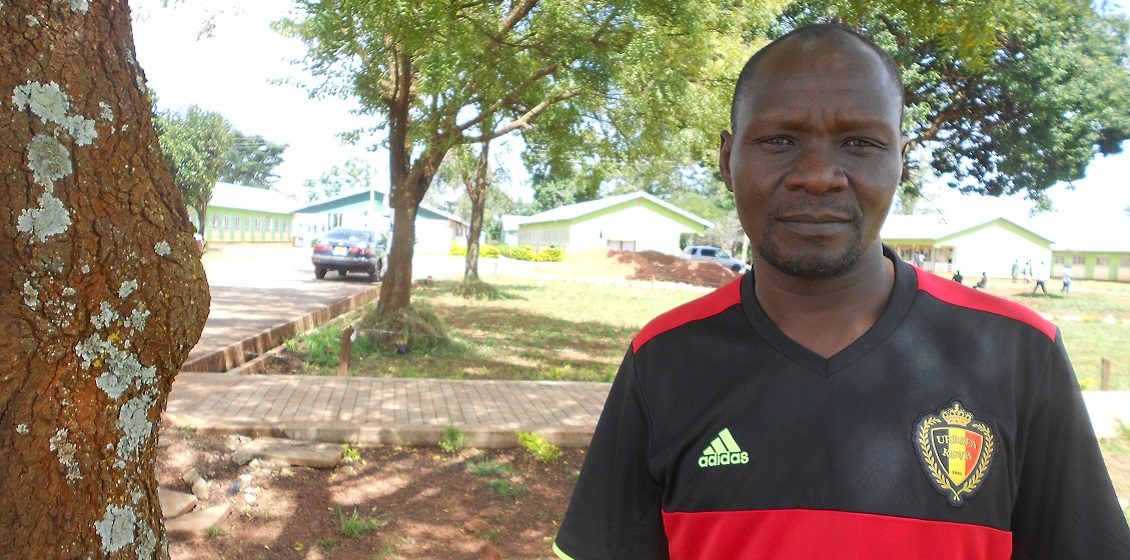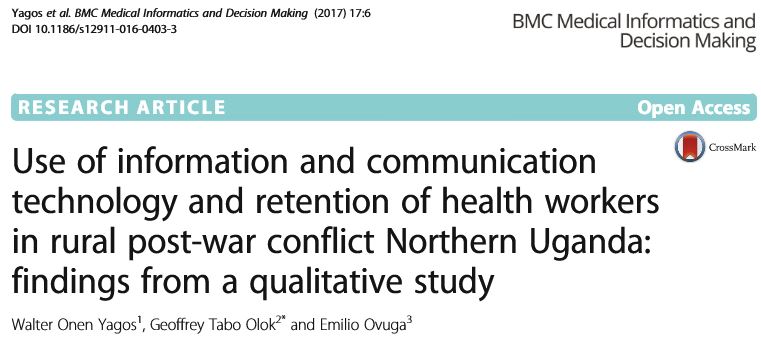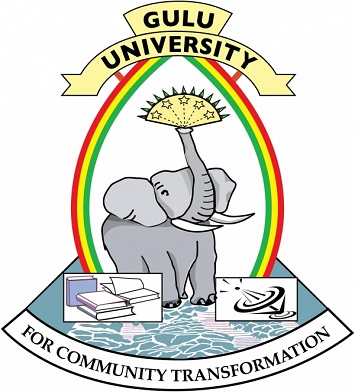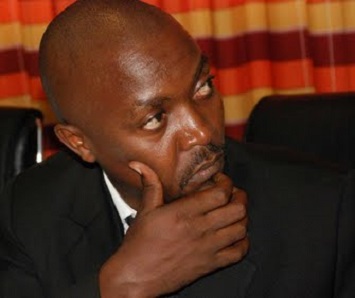Geoffrey Tabo Olok in 2016 enrolled at Aalborg University to study e-learning for his PhD. What is growing out of his action research is a new teaching and learning system at Gulu University that incorporates e-learning into the traditional and the newly adopted Problem Based Learning (PBL) approach. Olok and his supervisors now have their eyes on an ambitious plan to establish a centre of excellence in ICT research and learning not only for Gulu University but also to improve Africa’s relevance in that area.
In November 2019 he submitted for examination his thesis titled “Designing Infrastructure for Learning: Technology and Human Praxis.” The plan at first was for him to be co-supervised in Uganda and Denmark just like the rest of his BSU supported colleagues. At Gulu there was no capacity and they thought of Makerere as an option. The idea he had presented was about building an e-learning system basically from scratch. When he went for his first study stay in Denmark a decision was taken to enrol him fully at Aalborg.
A lecturer of Computer Science and IT, he was not studying e-learning in the pedagogical (teaching) perspective. Rather, he was looking at building infrastructures to support e-learning from technological, humanistic and policy perspectives.
“Normally we look at e-learning from a technical perspective, installing systems, and leave out the human perspective. When we do that, many times systems fail. My research combines all the three elements and I call it socio-technical, socio-cultural perspective,” he says. “I wanted to know the human elements that can inform building of ICT systems, looking at it from the social culture perspective. Can we include the people’s voices into what technology can deliver? That became my motivation.”
“The most interesting thing I came across is that research around infrastructure is very new in Uganda or in Africa, because there are basically no publications around that. Human infrastructure, as part of the system build up, is often ignored, leading to rejection,” he adds.
Olok also found that other universities’ attempts to deliver e-learning have not been sustainable, mainly because the beneficiaries [teachers] are not involved in developing them. “They are imposed through projects by agencies or organisations that think they are good.”
“When you talk about infrastructure here people think about roads, buildings, highways and all these data highways. They forget to talk about infrastructure as part of a system build up to what they want to deliver. Many times we have left humanities completely out of this game and humanities have got a whole new nexus to contribute to building infrastructure that suits their interest. And because we don’t do that normally, they tend to be resistant to change from their ways of doing things to a new way of doing something,” he says.
Olok found during his research that people don’t necessarily resist because of ignorance, but because they were not involved in the developmental of such a system. Some papers he has read, he says, consider technicians part of the infrastructure because without them a system cannot run, and the policies which enable a system to work are the organisational infrastructure.
“We end up only talking about the physical infrastructure, forgetting about the conceptual ideas behind this physical infrastructure, which to me I think is a very nice thing for us to begin to debate,” he stresses.
Olok’s e-learning system comes with the participation of teachers, which he says makes the system more adaptable. He did his baseline study at Muni, Makerere, Busitema, Kyambogo, Gulu and Uganda Christian University. While some seemed relatively fine, such as Makerere and Muni, others were really struggling.
“I looked at more project oriented ideas. If ‘project A’ is bringing in all this and they want to support e-learning, it ends with all that it has done. The top-down approach seems to have let down many institutions and now we think that building it from the ground so that the staff are the one pushing for that kind of service is more sustainable,” he says. “All of us seem to be struggling but we still want to attain the same goal. My belief is that when we bring the staff on board, because the students are on board already, we shall succeed,” he says.
Bring your own device concept
Over the last two years, Olok has been using what he calls the Bring your own device concept whereby there is no formal computer lab. Students come with their personal gadgets and the lab is set. When the lesson is done everyone goes home with their gadgets and the learning material. Tabo says this has worked well them. In a research he did with Masters students he found out that they now want to study using smart phones and other mobile devices.
“It is not the problem of students anymore. It’s the problem with the teachers. They need to believe,” he says.
One of the challenges the system faces is related to integrity. Teachers fear that when their content is uploaded on learning platforms, someone else may be assigned to use the same content, and they end up losing what they have built over time.
“What we are telling them is that we are going to have a high level of integrity such that you are the responsible person for your own content. Somehow the reception seems to be going in the right direction.
Olok’s project is inspired by the e-learning system at Aalborg, where students can access their course content online, as well as Maseno University in Kenya which has a complete online learning programme. What he is contributing to now is a learning environment for Gulu which incorporates e-learning, Problem Based Learning (PBL) and still maintains the conventional teacher-centred learning.
“We want to introduce blended learning. In Scandinavian countries they believe in democracy. So they have a lot of theories related to participation of stakeholders. In whatever engagement you have to bring people on board so they are able to voice in their issues. And if their voices are not captured then they also can be able to reject such a system,” he says.
Bringing Danish academic culture to Gulu
Olok arrived in Denmark to a learning environment different from what he had experienced in Uganda.
“There the student is completely independent. You decide what you want, how to do it, and if the methods are scientific they allow you to go and try it out. As a university student you are really in charge of your time, your activities, everything,” he says. “The library is very good, the supervisors are committed. Every two weeks there is a meeting with your supervisor. That is the good culture I want to bring here to our institution, following up on students.”
He also noticed that the Danes are hardworking and more efficient. “When it is time for work there is nothing else. People are expected to do their work – and the work is result oriented.”
The ICT research and learning centre
Olok and his supervisors – Prof. Lone Dirckinck Holmfeld, Prof. Michael Par-ola Zander and Dr. Betty Obura Ogange – have chosen Gulu as the base for their centre of excellence in ICT research and learning. Their target is to build a critical mass of researchers who look at the African context and build it into ICT systems to solve Africa’s problems, but also to address issues at the international level.
“We are looking at different people coming into a research environment at the centre and contributing to resilient systems, structures and policies to put Africa on the map of research and learning into ICT,” he says. “My professors are positive. They want to continue to support the university to build capacity in this area. So that if we have two, three, four or five PhDs that becomes a very strongly knowledge group researching into these issues.”
Olok is also looking forward to more research into PBL and other new forms of student centered learning in relation to ICT. “Now we have so many ICT tools that can enable collaboration and real time communication, and enable examination, testing and feedback systems. These research areas could possibly inform our future intervention.”
Policy
In his PhD conclusion, Olok advocates for a policy environment that allows end users to contribute their voices during the process of building e-learning systems.
“In doing that it slows the process even further. But when you build and the people are part of the systems, then they can identify with it more. The policy should be formulated in such a way that people’s rights to use the system to educate our children better should be respected.”
Although his research is more directly related to Goal 4 of the SDGs, about quality education, it is research is relevant to most of the other goals including Goal 17 on partnerships to achieve the SDGs. In Uganda’s Vision 2040, which targets to transform Uganda from a peasant to modern society, ICT is listed among strategic areas.
Research cooperation and collaboration
To improve research cooperation, Olok proposes the development of an IT system, including a website and use of collaborative tools, so that BSU participating universities are updated on activities taking place. This would enable them share stories and learn from each other. As we conclude out conversation, he stresses the need for a democratic approach to teaching and learning.
“There is a lot of power in the democracy when it comes to work. If we embrace this democratic approach, that your views are your views but allow me to critique your views, with the reasons why it should be different, that will be very good,” he says. “You don’t say that ‘I am the professor. Now there is nothing more’. That’s not true. Let’s allow the voices of the small ones, the first year students, to say what they think the university should look like.”
William Odinga Balikuddembe is a science journalist based in Kampala, Uganda











